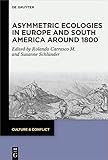Asymmetric Ecologies in Europe and South America around 1800 / ed. by Susanne Schlünder, Rolando M. Carrasco.
Material type: TextSeries: Culture & Conflict ; 21Publisher: Berlin ; Boston : De Gruyter, [2022]Copyright date: ©2022Description: 1 online resource (VIII, 324 p.)Content type:
TextSeries: Culture & Conflict ; 21Publisher: Berlin ; Boston : De Gruyter, [2022]Copyright date: ©2022Description: 1 online resource (VIII, 324 p.)Content type: - 9783110738186
- 9783110733365
- 9783110733211
- Ethnoscience -- South America -- History
- Human ecology -- Europe -- History -- 18th century
- Human ecology -- Europe -- History -- 19th century
- Human ecology -- South America -- History -- 18th century
- Human ecology -- South America -- History -- 19th century
- Indians of South America -- First contact with other peoples
- LITERARY CRITICISM / General
- Concepts of Nature
- Eurocentrism
- Human-Environment Relations
- Spanish American Enlightenment
- 304.209409034 23//eng/20220725eng
- GF13.3.E85 A89 2022
- online - DeGruyter
- Issued also in print.
| Item type | Current library | Call number | URL | Status | Notes | Barcode | |
|---|---|---|---|---|---|---|---|
 eBook
eBook
|
Biblioteca "Angelicum" Pont. Univ. S.Tommaso d'Aquino Nuvola online | online - DeGruyter (Browse shelf(Opens below)) | Online access | Not for loan (Accesso limitato) | Accesso per gli utenti autorizzati / Access for authorized users | (dgr)9783110733211 |
Frontmatter -- Contents -- Asymmetric Ecologies in Europe and South America around 1800: Introduction -- I Epistemic Asymmetries -- Humboldt and Epistemological Colonialism: Alexandra Wulf’s The Invention of Nature -- Climate, Man, and Culture in Eighteenth- Century Spain: From Feijoo (1728) to Masdeu (1783) -- Andrés Cavo Franco’s Historia de México (1797): Hydrology, Regeneration, and the Superiority of Nature -- Narrative, Writing about “Indians,” and Creole Epistemes in the Historias Naturales by Three Jesuits Banished from America (1767) -- II Asymmetric Identities -- Race and Reform in Late Colonial Santo Domingo -- The Asymmetries of American Ingenium: Echoes of the Eighteenth-Century Debate on Eugenio de Santa Cruz y Espejo -- III Asymmetries in Governmentality and Economy -- Between Agriculture and Culture: The Role of Nature in Jovellanos’s Memoria para el arreglo de la policía de los espectáculos y diversiones públicas and Informe de Ley Agraria -- Andean Metallic Abundance in Republican Times: Mariano de Rivero and his Civic Endeavor -- The Spanish Enlightenment and the Comprehension of the New World: Botany, Medicine, and the Search for New Remedies for the Old Empire -- IV Asymmetric Taxonomies -- The New World of Noah’s Ark -- Hierarchy and Continuity: The Order of the Natural World in Alexander Pope’s An Essay on Man and Erasmus Darwin’s The Temple of Nature -- V Asymmetries in Human-Environment Relations -- Lima 1746: Configurations of Catastrophe and Asymmetric Ecologies -- Island Texts and Archipelagic Writing: Alexander von Humboldt’s Isle de Cube: Antilles en général -- Transatlantic Approaches to Nature: Humboldt and his Environmental Concerns -- List of Contributors -- Name Index
restricted access online access with authorization star
http://purl.org/coar/access_right/c_16ec
This volume proposes new ways of understanding the historical semantics of the relationship between humans and nature in South America in the eighteenth and early nineteenth centuries. The authors in this volume use the notion of asymmetry to discuss the representations of and forms of knowledge about nature circulating in, and about, colonial and postcolonial South America. They argue that the production of knowledge about the American natural space widened the power gap between the Europeans colonizers and the local population. This gap, therefore, rests on what we call 'asymmetric ecologies': Eurocentric epistemic orders excluded forms of indigenous, mestizo, and Creole knowledge about nature. By looking at literary as well as non-literary sources, such as natural histories, travel narratives, encyclopaedias or medical writing, the essays in this volume trace the origins of new theoretical paradigms (ecocriticism, biopolitics, transarea studies, etc.), and examine the regional cultural, identity, and epistemic conflicts that undercut the Eurocentric narrative of enlightened modernity.
Issued also in print.
Mode of access: Internet via World Wide Web.
In English.
Description based on online resource; title from PDF title page (publisher's Web site, viewed 25. Jun 2024)


